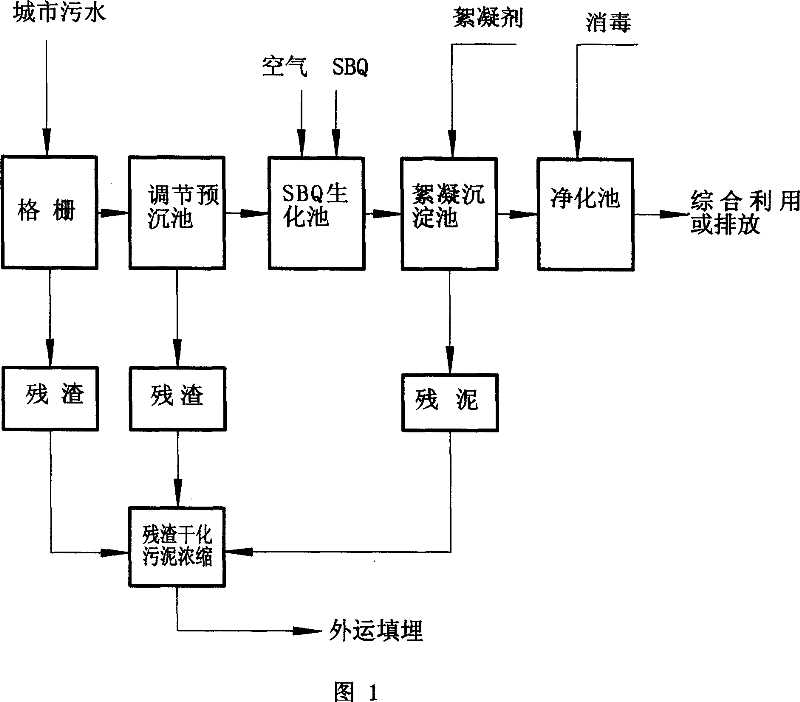High-effective microorganism complex agent and method of using the same for treating city sewage
A technology of high-efficiency microorganisms and compounding agents, which is applied in biochemical equipment and methods, biological water/sewage treatment, microorganisms, etc., can solve problems such as abnormal operation of sewage treatment devices, insufficient funds for sewage treatment, and large fluctuations in composition. Simple structure, convenient maintenance and replacement, and improved utilization
- Summary
- Abstract
- Description
- Claims
- Application Information
AI Technical Summary
Problems solved by technology
Method used
Image
Examples
Embodiment 1
[0035] 1. The ratio of high-efficiency microbial compound agent:
[0036] 12 grams of nitrifying bacteria, 10 grams of denitrifying bacteria, 10 grams of phosphorus accumulating bacteria, 12 grams of bacillus, 8 grams of photosynthetic bacteria, and 15 grams of yeast. Each gram of culture medium for a single species of bacteria contains 200 to 300 million bacteria.
[0037] 2. The method of using high-efficiency microbial compound agent to treat sewage, including operation units such as grille, regulating pre-sedimentation tank, biochemical tank, flocculation sedimentation tank, sludge concentration tank, etc.
[0038] (1) System debugging stage: after the sewage passes through the grid to remove large suspended solids, it enters the regulating pre-sedimentation tank to remove most of the sediment in the sewage, adjusts the pH value of the sewage to 6-9, and the temperature is 5-35°C. Add slow-release hydrogen peroxide 1.0g / m at the inlet of the sewage overflow tank after the ...
Embodiment 2
[0041] 1. The ratio of high-efficiency microbial compound agent:
[0042] 18 grams of nitrifying bacteria, 15 grams of denitrifying bacteria, 10 grams of phosphorus accumulating bacteria, 15 grams of bacillus, 13 grams of photosynthetic bacteria, and 12 grams of yeast. Each gram of culture medium for a single species of bacteria contains 150 to 200 million bacteria.
[0043] 2. The method of using high-efficiency microbial compound agent to treat sewage, including grille, regulating pre-sedimentation tank, biochemical tank, flocculation sedimentation tank, and sludge thickening tank operation unit;
[0044] (1) System debugging stage: after the sewage passes through the grid to remove large suspended solids, it enters the regulating pre-sedimentation tank to remove most of the sediment in the sewage, adjusts the pH value of the sewage to 6-9, and the temperature is 5-35°C. Add slow-release potassium peroxide (or hydrogen peroxide) 0.04kg / m at the inlet of the sewage overflow t...
Embodiment 3
[0048] 1. The ratio of high-efficiency microbial compound agent:
[0049] 8 grams of nitrifying bacteria, 7 grams of denitrifying bacteria, 14 grams of phosphorus accumulating bacteria, 12 grams of bacillus, 7 grams of photosynthetic bacteria, and 4 grams of yeast. Each gram of culture medium for a single species of bacteria contains 280 million bacteria.
[0050] 2. The method of using high-efficiency microbial compound agent to treat sewage, including operation units such as grille, regulating pre-sedimentation tank, biochemical tank, flocculation sedimentation tank, sludge concentration tank, etc.
[0051] (1) System debugging stage: after the sewage passes through the grid to remove larger suspended solids, it enters the regulating pre-sedimentation tank to remove most of the sediment in the sewage, adjusts the pH value of the sewage to 6-9, and the temperature to 5-35°C. Enter the biochemical pool, and stop water intake when the sewage submerges the biological filler in t...
PUM
 Login to View More
Login to View More Abstract
Description
Claims
Application Information
 Login to View More
Login to View More - R&D
- Intellectual Property
- Life Sciences
- Materials
- Tech Scout
- Unparalleled Data Quality
- Higher Quality Content
- 60% Fewer Hallucinations
Browse by: Latest US Patents, China's latest patents, Technical Efficacy Thesaurus, Application Domain, Technology Topic, Popular Technical Reports.
© 2025 PatSnap. All rights reserved.Legal|Privacy policy|Modern Slavery Act Transparency Statement|Sitemap|About US| Contact US: help@patsnap.com

